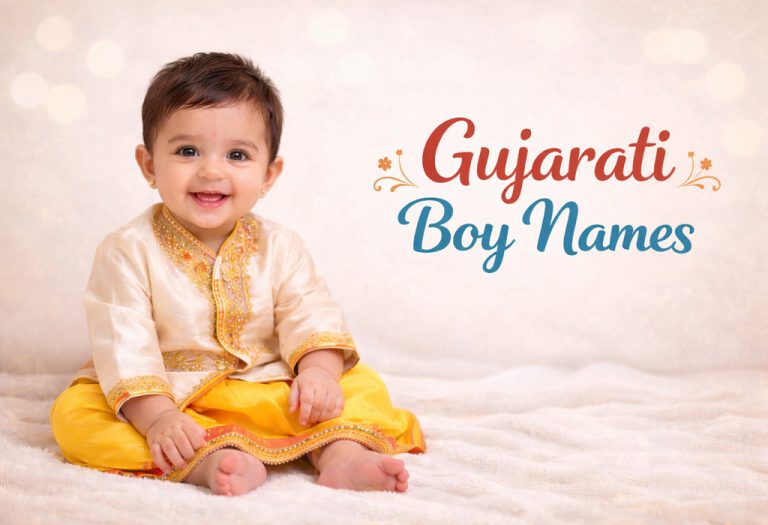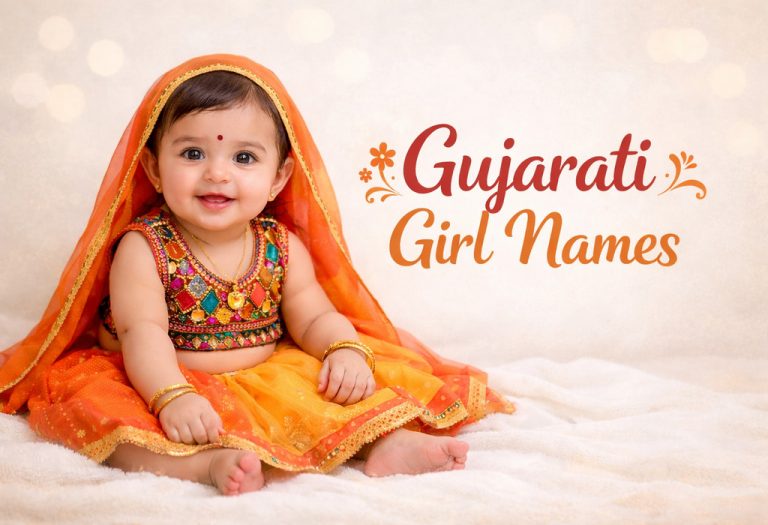Gandhi Jayanti Speech for Students and Children in English
“Be the change you wish to see in the world.” These powerful words by Mahatma Gandhi resonate with us today as we celebrate Gandhi Jayanti on the 2nd of October. Mahatma Gandhi, the pioneer of India’s freedom journey, is known worldwide for his peaceful approach and dedication to non-violence during India’s fight for independence. Every 2nd of October marks the birth anniversary of Mohandas Karamchand Gandhi, aka Mahatma Gandhi, whose efforts and values continue to inspire people across the globe.
As we gather today, whether at school or in any gathering, let’s encourage students to deliver a Gandhi Jayanti speech that brings to life his timeless message of peace and unity. If you’re preparing a Mahatma Gandhi Jayanti speech in English, this is a great time to reflect on the values he stood for. On this 2 October, let’s deliver a Gandhi Jayanti speech that inspires children to follow his teachings of harmony and non-violence.
10 Lines Speech on Mahatma Gandhi
If you’re looking for 10 lines on Gandhi Jayanti, this section will help capture the essence of his teachings. For those preparing a Mahatma Gandhi speech in English, this format will allow you to express his values simply and clearly.
This can also be used as a perfect Gandhi Jayanti speech for class 1 and so on, making it easy for children to understand the importance of Gandhi’s message. With this structure, you’ll have a well-rounded Gandhi Jayanti speech in English in 10 lines that highlights his timeless principles of truth and non-violence
- Mahatma Gandhi’s birth on 2nd October 1869 marked history.
- A beacon of peace, truth, and non-violence, he led from the front.
- Through ‘Satyagraha’, he showed the might of truth and patience.
- His Dandi March was a peaceful protest against British salt laws.
- Because of his guidance, India today enjoys the fruits of freedom.
- He championed simplicity, evident in his choice of hand-spun attire.
- For Gandhi, the spinning wheel was more than a tool, it was a philosophy.
- His principles continue to inspire countless souls globally.
- Celebrated worldwide, his messages of peace remain unmatched.
- Every 2 October, Gandhi Jayanti, we’re reminded of his unwavering spirit.
Mahatma Gandhi’s legacy isn’t just history; it continues to guide us today. If you’re preparing a 1-2 minute speech on Mahatma Gandhi in English, these words can provide inspiration. His timeless values can also be expressed in ten lines about Mahatma Gandhi, reminding us to embrace truth, non-violence, and the spirit of unity that he championed throughout his life.
Short Speech on Gandhi Jayanti for Kids
For our younger school students, especially those in the lower primary grades, who are keen on delivering a short speech on Mahatma Gandhi, we’ve tailored two samples just for you. These Mahatma Gandhi short speeches in English for students are concise, ranging between 200-300 words, ensuring they’re both engaging and easy to remember. Let’s explore them!
Short Speech on Mahatma Gandhi – Sample 1
Dear friends,
Whenever I think about peace and truth, one name instantly resonates: Mahatma Gandhi. Born on 2nd October, we celebrate his ideals and life every year through Gandhi Jayanti. More than a remembrance, this day calls us to embrace his values of non-violence and honesty. A beacon of compassion and courage, Mahatma Gandhi continues to inspire generations of all age groups at different timelines.
Mahatma Gandhi showcased that genuine transformation arises not from aggression but through compassion and mutual respect. His vision steered India to independence, powered not by weapons but by sheer will and peaceful defiance. He led powerful movements throughout India that inspired not only Indian citizens at that time but also people of other nations later on. Some of the popular movements he exercised include the Champaran Movement (1917), the Non-cooperation Movement (1920), the Civil-Disobedience Movement (1930), the Quit India Movement (1942), and more.
In today’s rapidly advancing world, it becomes even more vital to recollect his teachings. As we navigate our lives, let’s endeavour to radiate kindness, uphold truth, and champion what’s just. Today, let’s salute this luminous spirit and vow to uphold the principles he so ardently championed with different acts of kindness and compassion.
Short Speech on Mahatma Gandhi – Sample 2
Hello everyone,
This morning, I wish to share about a beacon of hope and resilience: Mahatma Gandhi. Gandhi Jayanti, celebrated on 2nd October, isn’t just a date but a testament to this great man’s enduring legacy.
He wasn’t merely a freedom fighter; he embodied hope. He engrained in us that victories are sweeter when achieved with patience and peace. Through non-violence, he illustrated that true power lies in gentleness and conviction. History has witnessed his powerful movements throughout India that inspired not only Indian freedom enthusiasts at that time but also people across continents. Some of the popular movements he exercised include the Champaran Movement (1917), the Non-cooperation Movement (1920), the Civil-Disobedience Movement (1930), the Quit India Movement (1942), and more.
As we confront daily adversities, let’s draw inspiration from Gandhi’s teachings. By fostering peace, love, and unity, we don’t merely remember him; we strive for a harmonious world.
Each small action we take has the power to reshape our world. Just as Mahatma Gandhi once profoundly expressed, “Be the change that you wish to see in the world.” Delivering a short speech on Gandhi Jayanti is meaningful, but truly imbibing the values and essence found in every small speech on Mahatma Gandhi is how we genuinely honour his teachings in our everyday lives.
Short Speech on Mahatma Gandhi – Sample 3
Good morning everyone,
Today, we gather to celebrate the life and teachings of Mahatma Gandhi, a man who showed the world that peace is more powerful than any weapon. Born on 2nd October, we celebrate Gandhi Jayanti to honour his journey and his dedication to non-violence and truth.
Mahatma Gandhi led India’s freedom struggle through peaceful protests, proving that change can be achieved without harm. His famous movements, like the Salt March and Quit India Movement, inspired millions to stand up for what is right, using only truth and patience. Gandhi believed in simple living and high thinking, and his messages continue to guide us even today.
As we remember him on this special day, let’s pledge to follow his teachings of kindness, honesty, and courage in our daily lives. Just as Gandhi taught us, “The best way to find yourself is to lose yourself in the service of others.” So, let’s all be kind, help one another, and keep spreading peace in everything we do.
Thank you.
Long Speech on Gandhi Jayanti in 400-600 Words
Dear students and children, immerse yourselves in the profound wisdom of Bapu through this Gandhi Ji speech. Embrace the teachings and legacy in this English speech on Mahatma Gandhi, tailored just for our budding leaders.
Long Speech on Mahatma Gandhi – Sample 1
Respected Principal sir/maam, teachers, and my dear friends, today we are assembled here to remember and commemorate a beacon of peace, the Father of our Nation – Mahatma Gandhi. As India marks Gandhi Ji’s 155th birth anniversary, it’s an honour to walk you through his journey.
Born in Porbandar, Gujarat, in 1869, Mohandas Karamchand Gandhi is widely recognised as Mahatma Gandhi. His legacy is so profound that 2nd October isn’t just celebrated in India but is also recognised by the UN as the ‘International Day of Non-Violence’. The moniker’ Mahatma’, signifying ‘the one with a grand soul’, was aptly bestowed upon him by the legendary Rabindranath Tagore.
From his early days as a barrister in South Africa, where he fought against racial discrimination, to his return to India, Gandhi Ji was determined to combat injustice. He became a pivotal figure in the Indian National Congress, initiating groundbreaking movements like the Champaran Satyagraha in 1917 and, later, the Dandi March and Quit India Movement. Other significant movements led by this popular figure include the Non-cooperation Movement in 1920, the Civil-Disobedience Movement in 1930, the Kheda Movement in 1914, the Khilafat Movement in 1920, and more. His principle of Ahimsa, or non-violence, wasn’t just a political strategy but a philosophy he lived by. People from different ethnicities and castes supported Gandhi Ji in their movements. One prime example of people supporting them is Sardar Vallabhbhai Patel, who, under Mahatma Gandhi’s guidance, directed several farmers to protest against the tax collection by Britishers during the times of the famine. Similarly, several other philanthropists of that time, including Sarojini Naidu, Jamanalal Bajaj, Vallabhbhai Patel, Vinoba Bhave, and more supported Gandhi.
His simple living, adorned in self-spun Khadi, was a testament to his belief in self-reliance and indigenous products. Apart from the fight for freedom, Gandhi Ji was a staunch advocate against social evils, pushing for women empowerment, supporting farmers, and championing Hindu-Muslim unity. His life’s motto, ‘My life is my message’, resonates with us even today.
On this day, our leaders, including our honourable Prime Minister and President, pay homage to Raj Ghat in Delhi. Schools and institutions nationwide commemorate his legacy with various programs and activities, such as slogan competitions, plantation drives, sketching competitions, skits, fancy dress competitions, seminars, and more. As we remember Gandhi Ji, let us pledge to imbibe his teachings of non-violence, truth, and harmony in our lives.
Jai Hind!
Thank You
Long Speech on Mahatma Gandhi – Sample 2
Honourable Principal, esteemed guests, revered teachers, and my dear fellow students,
Today, as we congregate in this hall, we pay homage to a visionary who not only led India to its much-desired freedom but also gifted the world a philosophy imbued with truth and non-violence. Mohandas Karamchand Gandhi, affectionately known as Bapu, is not just a historical figure; he is a beacon of hope, a symbol of perseverance, and a testament to the indomitable human spirit.
In the coastal town of Porbandar, 1869, Gujarat, the young Mohandas was as ordinary as any of us. But it was his experiences, both in India and abroad, especially in South Africa, that shaped his convictions, molding him into the Mahatma – the great soul. It’s these convictions that taught us the power of peaceful dissent, of Satyagraha, and of the belief that in the heart of all human beings, there resides an inherent sense of good.
But why, after so many years of his passing, do we still find the teachings of Gandhiji relevant? The world today is starkly different from the one he lived in. Yet, the core principles he advocated for are timeless.
In a world grappling with intolerance and discrimination, his unyielding stand against all forms of prejudice resonates strongly. At a time when he could’ve chosen to be bitter against those who were oppressed based on colour or caste, he chose love, understanding, and reconciliation. He dreamt of an India where all its citizens, irrespective of caste, creed, or religion, lived in harmony. This dream, in today’s diverse and often divided world, stands as a goal we should all strive towards.
Furthermore, as our planet faces unprecedented challenges, Gandhiji’s emphasis on sustainable living is more pertinent than ever. His life was a testament to minimalism. He believed in consuming only what was necessary. Today, as we deal with climate change and environmental degradation, adopting a Gandhian approach to consumption could very well be the solution we seek.
Another of his invaluable teachings was that of self-reliance. At a time when India was under colonial rule, he championed the cause of the indigenous industry, urging people to wear Khadi to spin their own yarn. This wasn’t just a protest against foreign goods but a call to every individual to be self-sustaining and to believe in their own potential.
Furthermore, in today’s era of rapid digital communication, where misunderstandings proliferate at the click of a button, Gandhiji’s commitment to truthful communication is a lesson for all. His regular writings, be it in ‘Harijan’ or ‘Young India’, always aimed at spreading truth and fostering understanding among communities.
To sum up, the life of Mahatma Gandhi stands as a testament to the power of will, the strength of conviction, and the potential of the individual to bring about meaningful change. His journey, from being the young, unsure Mohandas to becoming the Mahatma, is a journey each of us can undertake in our own capacities. As we remember him today, let’s pledge to imbibe and inculcate his teachings, to be the change we wish to see, and to create a world that he would be proud of.
Thank you.
Long Speech on Mahatma Gandhi – Sample 3
Respected Principal, esteemed teachers, and dear friends,
Today, we gather to honour the man who gave India its freedom and taught the world that peace is more powerful than violence. Mahatma Gandhi, born on 2nd October 1869, in Porbandar, Gujarat, devoted his entire life to the principles of truth, non-violence, and justice. Gandhi Jayanti is not just a day to remember his birth, but to reflect on the lessons he left behind for humanity.
Gandhiji’s belief in Ahimsa, or non-violence, was the foundation of his fight for independence. He showed us that even the most powerful empires can be challenged without lifting a single weapon. His peaceful movements, such as the Salt March and the Quit India Movement, encouraged millions of Indians to join the struggle for freedom. His philosophy wasn’t limited to political freedom alone; he fought for social justice, equality, and the removal of untouchability in India.
One of the remarkable aspects of Mahatma Gandhi’s life was his simplicity. He wore clothes made from hand-spun Khadi as a symbol of self-reliance and empowerment. He believed in living with minimal needs, showing us that happiness doesn’t come from material wealth but from inner peace and contentment.
In today’s world, as we face challenges of inequality, violence, and environmental issues, Gandhiji’s teachings remain incredibly relevant. His message of non-violence and tolerance can guide us in dealing with modern-day conflicts. Furthermore, his emphasis on sustainable living is crucial as we tackle issues like climate change.
As we celebrate Gandhi Jayanti, let us all pledge to follow his path of truth, non-violence, and simplicity in our own lives. Let’s work together to create a society that Gandhiji dreamed of—one that is just, peaceful, and united.
Thank you.
FAQs
1. What is a good way to initiate a speech?
One can begin by introducing the core idea or by sharing a relevant quote. This not only sets the tone but also engages the audience right from the start.
2. How can you enhance the impact of your speech?
To amplify the effectiveness of your speech, keep it concise, use relatable anecdotes, maintain a clear structure, and employ vocal variations to emphasize key points. Additionally, interactive elements like questions can engage the audience.
3. How many years of Gandhi Jayanti celebrations does 2025 represent?
The year 2025 marks 156 years of Gandhi Jayanti celebrations since Mahatma Gandhi’s birth in 1869.
4. Can you list some prominent freedom movements led by Mahatma Gandhi?
Some of the major movements initiated by Mahatma Gandhi include the Non-Cooperation Movement, the Salt March or Dandi March, and the Quit India Movement.
5. What are some key themes to touch upon in a Gandhi Jayanti speech?
In a Gandhi Jayanti speech, one can discuss Gandhi’s philosophy of non-violence, his contribution to India’s freedom struggle, and his enduring impact on global peace and justice movements.
6. How to incorporate Gandhi’s teachings in a modern-day speech?
One can draw parallels between current global challenges and Gandhi’s principles, emphasizing the relevance of his teachings on non-violence, truth, and harmony in today’s context.
7. What are some of the most famous slogans associated with Mahatma Gandhi?
Mahatma Gandhi slogans that are closely associated with him include:
- “Satyameva Jayate” (Truth Alone Triumphs)
- “Be the change that you wish to see in the world.”
In delivering a speech about Gandhiji in English, we don’t just remember a historical figure, but we embrace timeless values of truth, non-violence, and perseverance. His teachings, transcending generations, serve as a guiding light, urging us to be agents of positive change in our world today.
Infographic: 10 Lines Speech on Gandhi Jayanti
Also Read:
Gandhi Jayanti Quotes, Wishes and Messages
Mahatma Gandhi Quiz for Kids and Adults
Kid-Friendly Movies on Mahatma Gandhi’s Life
Mahatma Gandhi Information and Facts for Kids
Gandhi Jayanti History, Significance and Celebration
Was This Article Helpful?
Parenting is a huge responsibility, for you as a caregiver, but also for us as a parenting content platform. We understand that and take our responsibility of creating credible content seriously. FirstCry Parenting articles are written and published only after extensive research using factually sound references to deliver quality content that is accurate, validated by experts, and completely reliable. To understand how we go about creating content that is credible, read our editorial policy here.





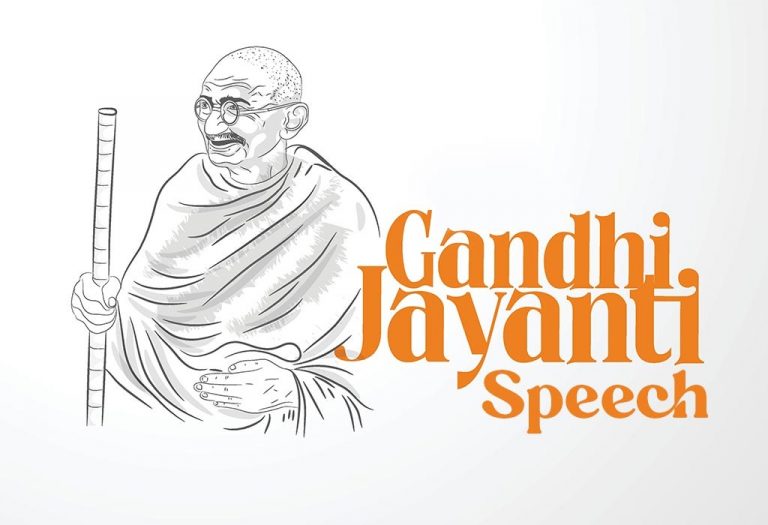
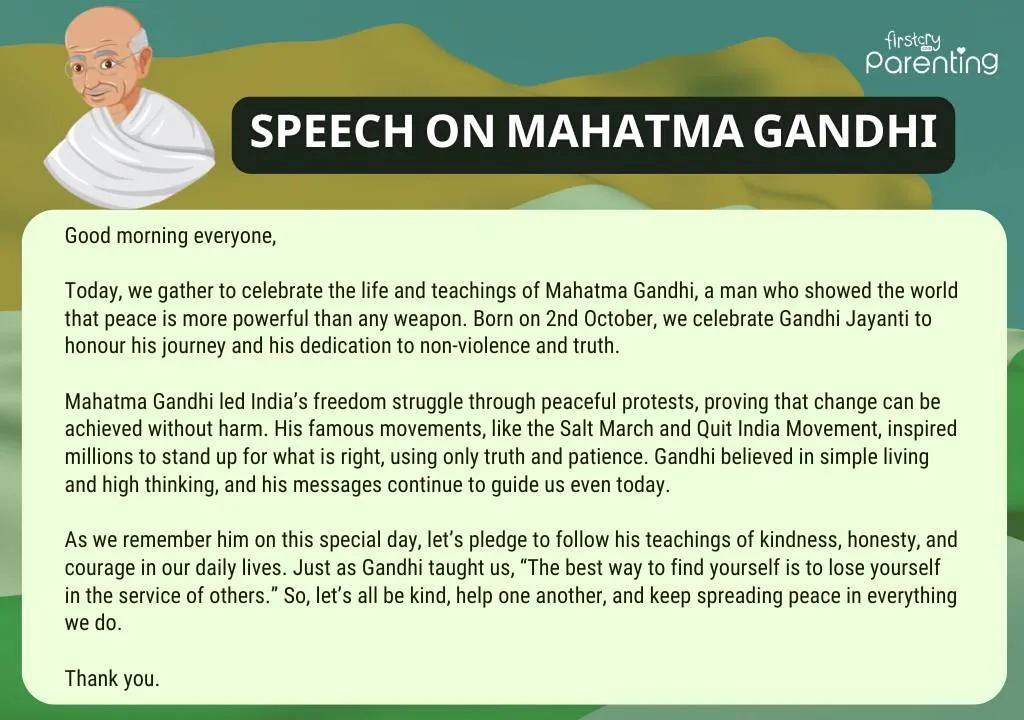
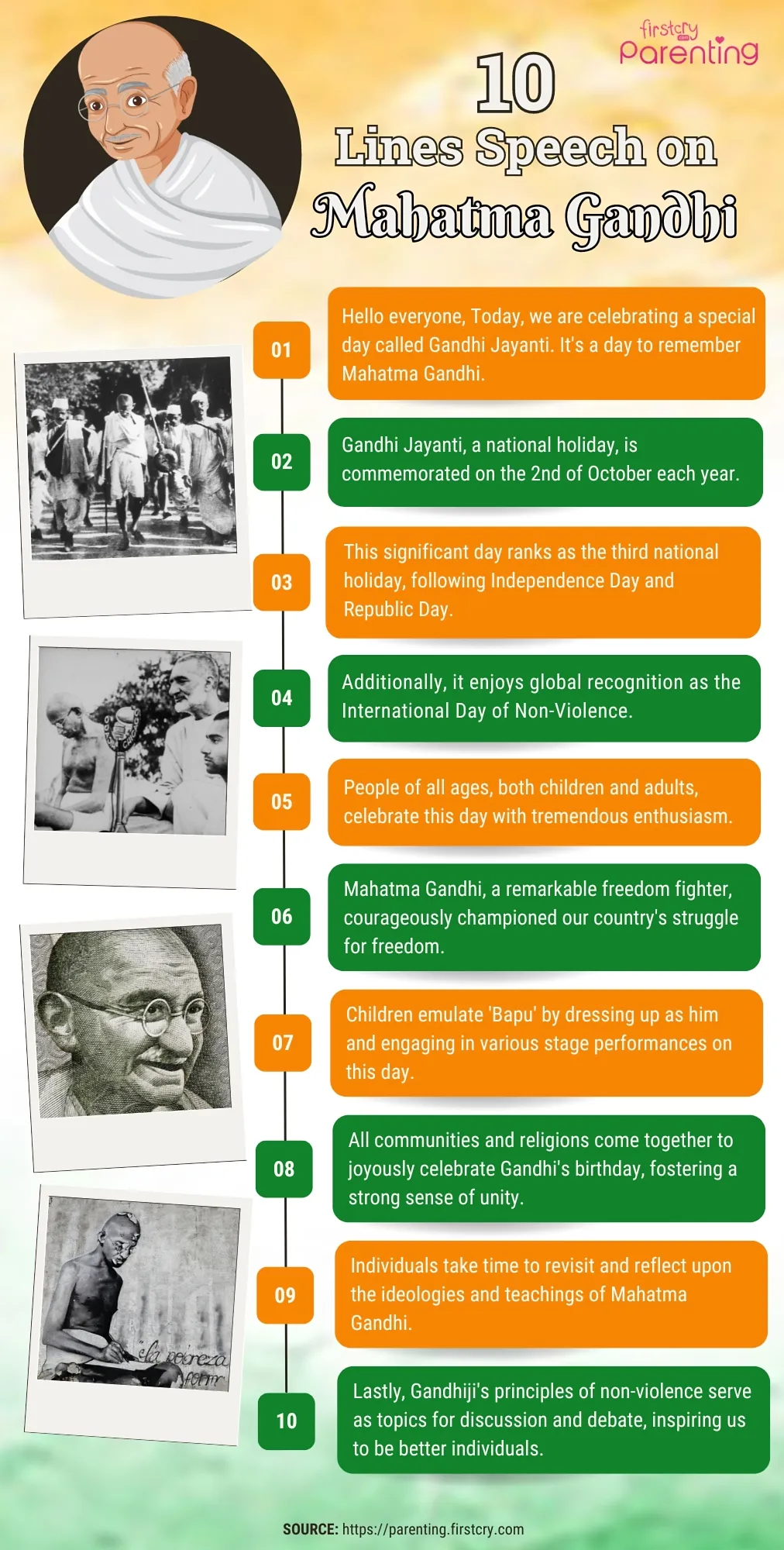

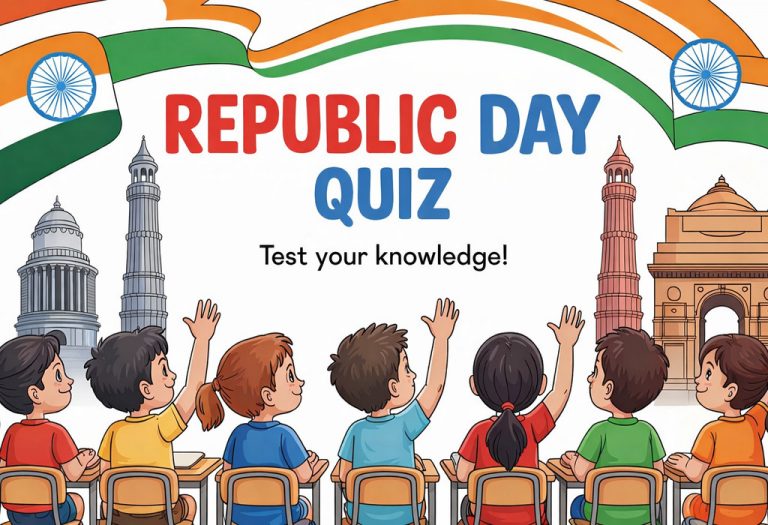





.svg)








